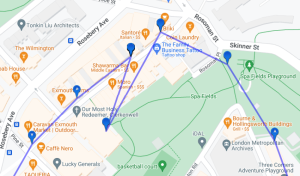Warnings from the UK: 24/7 racialised GPS surveillance
Campaigners assembled outside Capita PLC’s Annual General Meeting in the City of London on Thursday 11 May are contesting the outsourcing company’s £114m contract to deliver 24/7 GPS monitoring services, used by the Home Office to surveil people without British citizenship.
The UK government monitors migrants’ GPS location 24 hours a day, 7 days a week, using ankle tags or GPS-enabled fingerprint scanners. People who are tagged have described it as “psychological torture”, feeling “held over a barrel of fear and intimidation”. The racial stigma is a burden as well: “Obviously, I’m a black male with a GPS monitor on my ankle, the stereotype is flashing before their eyes”. An Equality Impact Assessment performed by the government itself has recognised that “hostile environment” measures “may disproportionately impact on people of colour”, and that GPS tracking specifically “may disproportionately affect some nationalities”.
GPS tracking can be imposed as a condition for granting immigration bail, officially to prevent people from absconding and to monitor compliance with other bail conditions (e.g. no right to work). While originally confined to cohorts of foreign national offenders subject to deportation, tagging has now been massively expanded and can be used on anyone who arrives to the UK by “unnecessary and dangerous routes”. Over 3 500 people on immigration bail are currently tracked.
Disproportionate surveillance
The devices collect location data every few seconds – enabling constant, real-time surveillance. Immigration authorities can then access the data for various reasons, including assessing people’s immigration applications when they make a claim involving Article 8 ECHR (the right to private and family life). But someone’s location history, commonly termed ‘trail data’, can reveal intimate and sensitive details of their life – such as trips to an abortion clinic, a gay bar, a bookstore, a place of worship, a cancer treatment centre, etc. The UK Home Office has thereby granted itself unprecedented snooping powers, arguably beyond what the legislation authorises and in contravention of a number of data protection and human rights.
While former UK Prime Minister Boris Johnson defended the policy as essential so that people do not “just vanish” into the country, very few people actually “vanish” – absconding rates are exceedingly low. Public watchdogs have also denounced “the lack of evidence for the efficacy of tagging”. So it’s like using a dysfunctional sledgehammer to crack a minuscule nut. Civil society and lawyers have since 2021 been fighting against this hostile practice – researching and denouncing the psychological and physical toll it takes on people, filing complaints with data protection and forensic science regulators, and pursuing court cases against individual tagging orders, hoping to move courts to scrutinise the policy as a whole.
These are real testimonies from tagged individuals, recounting the impact that tagging has on their lives. They are enacted by actors to protect anonymity.
Privacy International’s team of technologists have performed real-life testing and technical analysis of GPS ankle tags procured on the open market. By acting both as wearers and controllers of the devices, and of the resulting location data, they found a number of accuracy issues. In several instances, the tag wearer was marked in a different place than their actual location – such as in a church when they were in fact cycling along a road, or in the street parallel to their house when they were actually home all night. When authorities rely on this data to make decisions about people’s compliance with their bail conditions or the legitimacy of their Article 8 claims, even small inaccuracies can have devastating consequences.

Screenshot of GPS tag data management platform
Usual suspects: the private sector
As usual, a number of private companies are profiting from this harmful policy – the government has outsourced the technical infrastructure, but also the data collection, processing and storage, and day-to-day management of the scheme. One company in particular, Capita PLC, has a particularly lucrative contract (£114m over three years) to manage all aspects of tagged people’s interactions with the government. They claim to support the Black Lives Matter movement, and to be a purpose-driven business. They further stretch credibility by claiming that electronic monitoring “help[s] protect communities” or “improve[s] societal outcomes”, and that they deliver services to immigration authorities “with care and empathy”. In light of the harm that GPS tagging causes, and the lack of evidence for its usefulness, this is corporate speak to rubber stamp the gigantic profits they make off this policy. Migrant rights organisations and EDRi member Privacy International are calling on Capita to uphold the values they claim to pursue and withdraw from providing tagging services to immigration authorities.
“Just a few years ago, like many companies, Capita was jumping to espouse values of anti-racism and justice, yet they facilitate racialised surveillance by tracking non-British people - including asylum seekers and people born & raised in the UK. GPS tracking is a punitive and inhumane practice that causes mental and physical harm for the wearer & damages social relationships with family and the community. We urge Capita to take a principled stance and make these harmful policies obsolete.”
“The digital GPS tracking Capita provides to the Home Office is a direct extension of the ‘physical’ hostile environment our members face every day: disproportionate and cruel by design. Instead of lining the pockets of private companies like Capita, the government should be putting resources towards supporting everyone in this country to lead lives in conditions of dignity— not surveillance.”
“Capita PLC claims to be a purpose-driven business, but what kind of a purpose is subjecting non-British citizens to 24-hour surveillance? It’s punitive, controlling, unnecessary, and has severe human rights implications - the government is already under investigation and facing various legal claims. Companies should not be blindly profiting from such hostile policies. Last year we saw charter airlines refusing to fly asylum seekers to Rwanda - we call on Capita and its shareholders to follow suit and prioritise the dignity of vulnerable people over profit.”
The article was first published by EDRi member Privacy International here.

